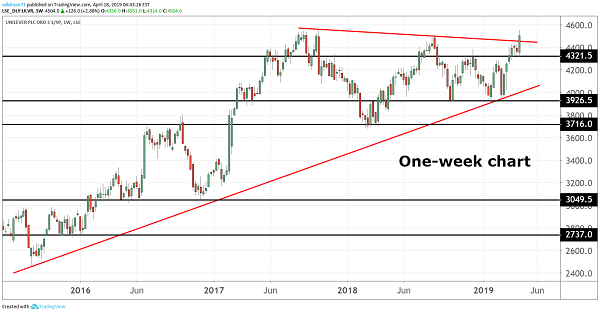
Unilever: Why there’s lots to like about this FTSE 100 star
By Graeme Evans from interactive investor.
These first quarter numbers have been well received, and this market favourite still has lots to go for.
Unilever (LSE:ULVR) shares surged to within a few pence of a record high last week as first-quarter trading figures heightened focus on whether this defensive and reliable dividend payer can offer further value to investors.
Shares have already risen 17% to 4,525p in the past year, with the consumer goods giant best known for brands including PG Tips teabags and Colman’s mustard now trading, with a projected 2019 price/earnings multiple of just under 20 times. While that’s still a 7% discount to the EU staples sector, analysts at UBS think the current share price looks to represent fair value.
But what’s interesting from an investor viewpoint is that Unilever still appears to have plenty to go for in terms of underlying sales growth and margins improvement.

Source: TradingView Past performance is not a guide to future performance
There were signs of progress on both fronts in today’s Q1 figures, with underlying sales growth of 3.1% beating market consensus at 2.8%. This followed a broad-based performance made up of a 1.2% rise in volume/mix and 1.9% from higher prices. Despite this, UBS said that the improvement still lagged Nestle’s 3.4% organic sales growth and 2.2% rise in volume/mix.
UBS added:
“Unilever noted that its markets were growing at around 3%, which implies that the company is not outperforming yet.”
On the operating margin, new Unilever boss Alan Jope said the company remained on track to meet its long-term target of achieving a figure of 20% by next year. This would represent a big improvement on the 16.5% recorded in 2016 but still lags the rate of global peers such as Reckitt Benckiser (LSE:RB.) with an industry-leading 26.7% in 2018.
The consensus forecast for the current year margin is for Unilever to achieve a figure of 19.1%, accompanied by underlying sales growth of 3.4%.
Unilever’s dividend has risen unchecked for the best part of four decades, with the company returning over €10 billion to shareholders through buy-backs and dividends in the last financial year. The stock continues to yield in the region of 3.5% before rising above 4% in future years.
Its defensive qualities have made Unilever a popular pick in the FTSE 100, although, as Bunzl (LSE:BNZL) showed yesterday, reassuringly expensive stocks can sometimes trip up. Shares in the outsourcing firm fell more than 10% after it reported a slower pace of growth in North America.
While Unilever admitted trading in developed markets remained weak, it continues to benefit from strong growth in emerging markets after a rise of 5% in Q1 underlying sales growth. This was driven by South East Asia and Brazil, with India markets also doing well.
Analysts at Jefferies said the performance amounted to a decent start to the year, particularly given tough volume comparisons and some “secular headwinds”. They have a price target of 4,380p.
The 2020 margin target was put in place by former boss Paul Polman in the aftermath of an attempt by Kraft Heinz to buy the Anglo-Dutch business for around £115 billion in February 2017. The US giant’s interest proved to be short-lived, with Unilever now in a position to turn the tables on its rival based on their respective market valuations.
Unilever also appears to have moved on from the furore over its decision to shut its London headquarters in favour of a single base in Rotterdam. Had it gone ahead, shares in London-listed Unilever plc – one of two parent holding companies – would have been replaced with shares in Amsterdam-listed Unilever NV.
These articles are provided for information purposes only. Occasionally, an opinion about whether to buy or sell a specific investment may be provided by third parties. The content is not intended to be a personal recommendation to buy or sell any financial instrument or product, or to adopt any investment strategy as it is not provided based on an assessment of your investing knowledge and experience, your financial situation or your investment objectives. The value of your investments, and the income derived from them, may go down as well as up. You may not get back all the money that you invest. The investments referred to in this article may not be suitable for all investors, and if in doubt, an investor should seek advice from a qualified investment adviser.
